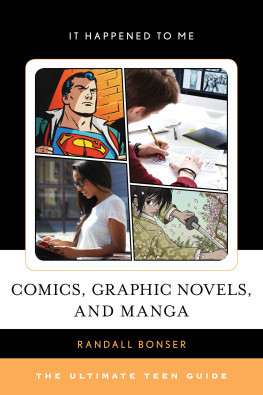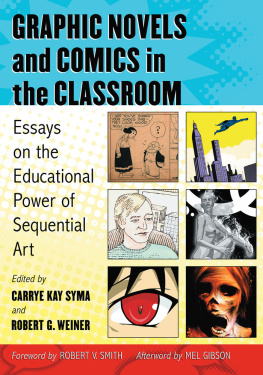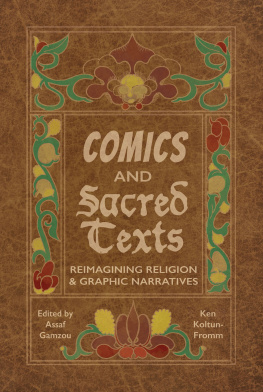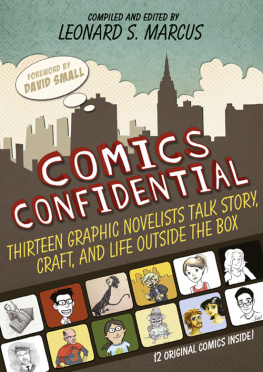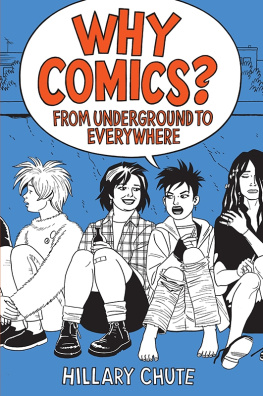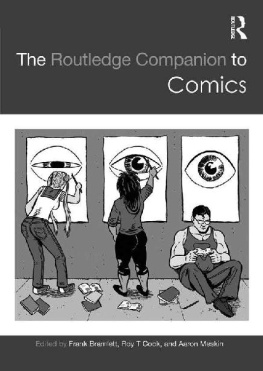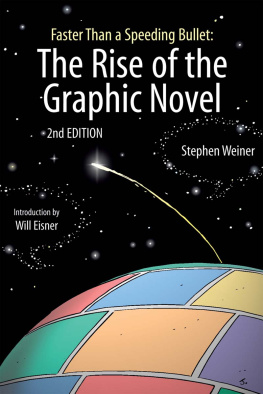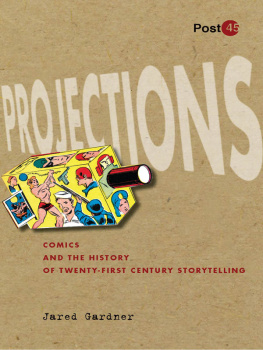WORLD COMICS AND GRAPHIC NONFICTION SERIES
FREDERICK LUIS ALDAMA AND CHRISTOPHER GONZALEZ, EDITORS
The World Comics and Graphic Nonfiction series includes monographs and edited volumes that focus on the analysis and interpretation of comic books and graphic nonfiction from around the world. The books published in the series use analytical approaches from literature, art history, cultural studies, communication studies, media studies, and film studies, among other fields, to help define the comic book studies field at a time of great vitality and growth.
[ CHRISTOPHER PIZZINO ]
Arresting Development
COMICS AT THE BOUNDARIES OF LITERATURE

University of Texas Press
AUSTIN
Copyright 2016 by the University of Texas Press
All rights reserved
First edition, 2016
Requests for permission to reproduce material from this work should be sent to:
Permissions
University of Texas Press
P.O. Box 7819
Austin, TX 78713-7819
http://utpress.utexas.edu/index.php/rp-form
LIBRARY OF CONGRESS CATALOGING-IN-PUBLICATION DATA
Names: Pizzino, Christopher, author.
Title: Arresting development : comics at the boundaries of literature / Christopher Pizzino.
Description: First edition. Austin : University of Texas Press, 2016. Includes bibliographical references and index.
Series: The world comics and graphic nonfiction series
Identifiers: LCCN 2016003031 (print) LCCN 2016005501 (ebook)
ISBN 9781477309773 (cloth : alk. paper)
ISBN 9781477310687 (pbk. : alk. paper)
ISBN 9781477309780 (library e-book)
ISBN 9781477309797 (non-library e-book)
Subjects: LCSH: Comic books, strips, etc.History and criticism.
Classification: LCC PN6714 .P59 2016 (print) LCC PN6714 (ebook)
DDC 741.5/9dc23
LC record available at http://LCCN.loc.gov/2016003031
doi: 10.7560/309773
For Michael McKeon
Contents
Acknowledgments
I think it fitting to begin by thanking my students at the University of Georgia, whose sharp eyes and critical skills have shaped my own perceptions. I would be remiss not to recognize the following individuals by name: Elizabeth Beck, Caitlin Belton, Lauren Berg, Katelyn Binder, Philip Brettschneider, Justin Burnley, Tiffany Chu, Andrew Cole, Parker Couch, Nikki Curry, Ben DeCorso, Wes Fenlon, Ariel Garrett, Sean Gorman, Josh Johns, Jacob Karle, Zach Keepers, Christine Lee, Jamie Lewis, Joey Lynn, Jasmine Morrissette, Patrick Najjar, Miranda Nelson, Erin OQuinn, Lian Peters, Emma Powers, Emily Shaw, Mike Smith, Ty Stewart, MacKenzie Turner and Tom Webster. I am indebted to students in my 2014 graduate seminar, Image Theory and Visual Narrative, for stimulating discussion that influenced the final shape of the book. I also thank the members of UGAs Comics Reading Group, especially Miriam Brown-Spiers, Laurie Norris and group founder Casey Westerman, for being great interlocutors in the early stages of my research. I also offer thanks to UGAs Comics Creators Association, particularly group founder Megan Nelson, whose enthusiasm, wisdom and goodwill exemplify whats best in the comics community.
Time and resources for the completion of key portions of this book were generously supplied by a research fellowship from the Willson Center for the Humanities and Arts at UGA and by the universitys Sarah Moss Research Grant. Not all comics scholars receive such pronounced support from their home institutions, and I feel my debt to the university keenly.
It takes a village to complete a bookat least it does when the book is mineand this work has benefited from not one but two strong villages. My colleagues in UGAs English Department welcomed the arrival of a comics scholar in their midst and have provided unstinting professional and intellectual support. Doug Anderson, Adam Parkes and Aidan Wasley have been trustworthy guides and mentors throughout the process of writing and publication. Michelle Baliff, Chris Eaket, Roxanne Eberle, LeAnne Howe, Miriam Jacobson, Barbara McCaskill, Richard Menke, Jed Rasula, Susan Rosenbaum, Esra Santesso, Fran Teague and Andrew Zawacki all deserve thanks for being there, as readers, interlocutors or cheerleaders, as this book coalesced. Thanks also to Ed Pavli, whom I had the pleasure of working with before we arrived by separate routes at UGA. Ed has remained a valued colleague and adviser through bad times and good.
The second village is the field of comics studies, which has offered intellectual sustenance and solidarity despite its being scattered across so many disciplines. While grateful to colleagues Ive met at countless conference centers, restaurants and hotel lobbies and lounges over the years when this book was written, I have special debts to those with whom Ive worked in the Modern Language Associations Discussion Group on Comics and Graphic Narratives, including Jonathan Gray, Susan Kirtley, Martha Kuhlman and Nhora Luca Serrano. I also thank Tim Caron, with whom Ive had the pleasure of crossing paths at conferences since before the Discussion Group existed, and Hilda Chacn, who was good enough to include my paper on Gilbert Hernandez on a panel at MLA 2013. I am indebted to Qiana Whitted for great conversations on mid-century comics during a visit she made to UGA in 2014. Donald Ault at the University of Florida, along with Mel Loucks and the other organizers of the universitys Conference on Comics Studies, deserves special mention; I appreciate the opportunity to present my work, and I thank the conference participants for the stimulating discussion that influenced some of this books key concepts. William Kuskin has been a great editor, mentor and friend, and my interactions with him have fortified my critical resolve and sharpened this books purpose again and again. I must especially thank Charles Hatfield and Hillary Chute; I owe great personal and intellectual debts to both of them, not least for serving as insightful readers of the manuscript. Charles has been an exemplary senior colleague, and his wisdom is surpassed only by his graciousness. Hillary, whom Ive had the privilege of knowing since graduate school, remains a deeply valued friend and interlocutor.
My oldest scholarly and personal debts, which I can never hope to repay, are the greatest pleasure to acknowledge here. Anthony Lioi has been as wonderful a friend and fellow nerd as I could hope to have, and I feel keenly how inadequate any words of thanks to him could be. Im grateful for his faith in this project, which not infrequently surpassed my own. It is also a delight to thank Channette Romero, whose years of encouragement, advice and friendship have been invaluable beyond measure. Without her support, not least her reading of portions of this manuscript and her patience in listening to many halting expositions of half-finished ideas, this book would never have been completed.
Any responsible fan-addict should not neglect to thank his or her dealers, and thus I must pay tribute to Rob Brown and Devlin Thompson at Bizarro-WUXTRY, a comix shop worthy of the name. I am also thankful for superb research assistance from Eric Aubuchon, Rajesh Reddy and especially Kaitlyn Smith, who tackled a number of complex tasks with great skill and insight.
Working with the University of Texas Press has been a true pleasure. The support provided by Jim Burr has made all the difference, and I am grateful for the chance to thank him in print for the key role he has played in making this book a reality. Frederick Luis Aldama and Christopher Gonzalez, editors of UTPs World Comics and Graphic Nonfiction series, likewise deserve greater thanks than I can easily articulate. Its been a privilege to get to know Frederick and to reconnect with Christopher, who has long had my respect as a colleague and as my editor for the special issue of
Next page

